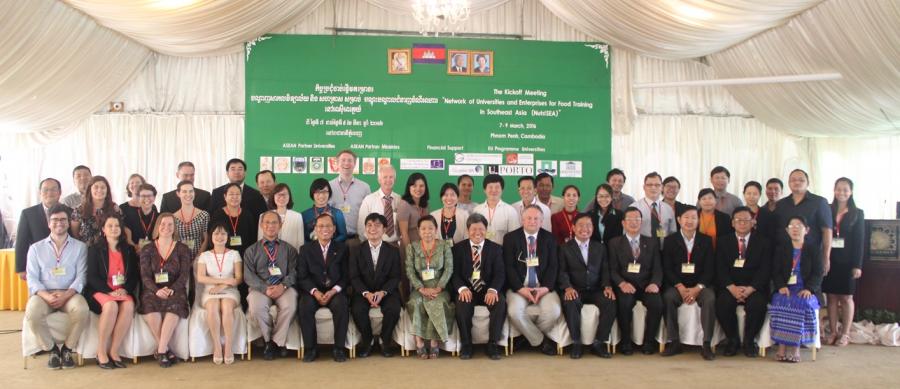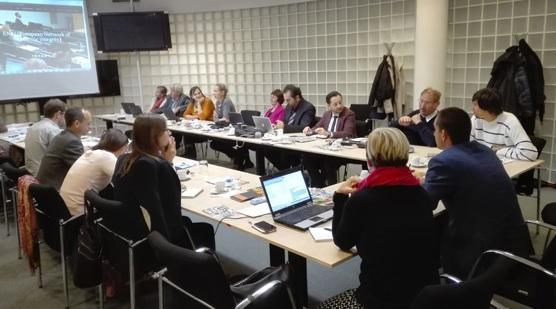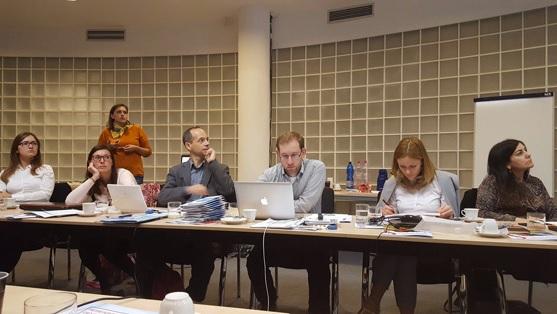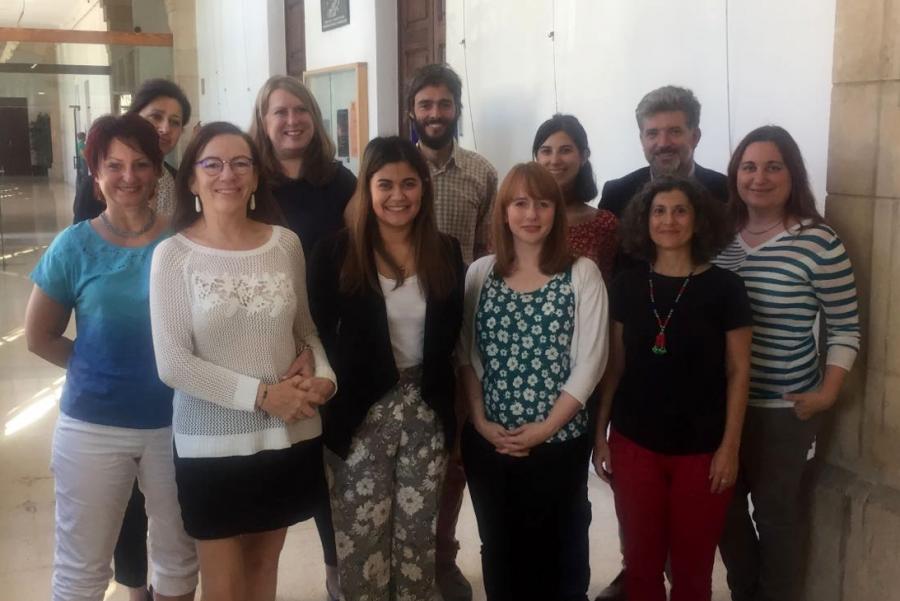InterNews
Projects
« InterNewsLaunch of the Rec-Mat Project
March 6th 2018
ProjectsFrom the 6th to the 8th of March, the University of Porto will welcome around 20 participants from European, Brazilian and Argentinian institutions to launch the project "Rec-Mat: Recognition Matters". The Kick-off meeting marks the start of the project funded by the European Commission for the next 3 years (until 2020), through the Erasmus+ programme’s action 2 Capacity Building Higher Education.
Partners will work in the field of academic recognition, with the objective of contributing to facilitate the mobility of students between Latin America and Europe and reduce barriers related to the process of academic recognition. The 648,228 thousand euros of funding for the project will support activities and joint work of the partners, so as to enable Higher Education Institutions to implement fairer and more transparent processes in these regards.
The Rec-Mat project is based on the vast experience of partners in the LA region, and the challenges identified over time, in relation to different Educational Systems, principles, practices and tools to support of academic recognition. The project brings proven innovation through its activities, linking the political and practical dimensions inherent to the recognition of academic training, during student mobility (teaching staff training activities, piloting of case studies and policy debate activities).
Rec-Mat’s methodology is also original in the proposed target audiences and actors involved: not only the International Relations and Academic departments, but also professors (coordinators and programme directors), authorities identified as key decision makers in the process of recognition, as well as IT technical staff involved in developing support tools/information systems.
Through the project’s implementation, partners also intend to raise awareness among teaching staff for the importance of full academic recognition as well as for the relevance of the internationalisation of HE, through a peer approach. These objectives will be achieved through the project activities, such as the Rec-Mat blended training with a physical and online component (MOOC) which aims to bring together Latin American professors who are ‘resistant' to the reality of international mobility and distant from the bologna rationale - with more experienced and ‘pro-internationalisation’ colleagues of its institutions as well as of the European partners. In addition to training activities, in the context of the project real mobility pilot case studies will be promoted, with the goal of evidencing successful practical examples.
The partners intend to so build capacity of the involve institutions, to prepare them to frame formal academic recognition, at institutional level as well as to develop concrete technical solutions (tools/systems), to facilitate this process.
Through the publication of a final compendium and the organisation of national and international public events, partners intend to also bring the topic to a wide discussion by encouraging other institutions to adopt more transparent procedures and to share the innovative results of the Rec -Mat project (namely the MOOC, the compendium and its conclusions paper).
NutriSEA - Network of Universities and Entreprises for Training in Southeast Asia
November 23rd 2016
ProjectsThe University of Porto is one of the 6 European institutions joining forces with 8 institutions of Cambodia, Vietnam and Myanmar to strengthen international collaboration and entrepreneurship in the agro-food sector of Southeast Asia.
This cooperation will take place under the NutriSEA project - Network of Universities and Entreprises for Training in Southeast Asia, funded by the European Commission’s Erasmus + programme.
Coordinated by Ghent University (Belgium) and co-coordinated by the Royal University of Agriculture (Cambodia), the project’s European partners are: U.Porto, the University Toulouse III Paul Sabatier (France), University of Göttingen (Germany), Wageningen University (Netherlands) and the Hungarian research center Campden BRI. The Asian partners are the Ministry of Education, Youth and Sport and the Chea Sim University of Kamchaymear (Cambodia), the Vietnam International Education Development, the Hanoi University of Science and Technology and Hue University of Vietnam and the Yezin Agricultural and Yangon universities of Myanmar.
One of the aims of the project is to set up a regional food network with stakeholders from academia, business and authorities. The European partners will deliver trainings for staff of universities in Cambodia, Vietnam and Myanmar on different topics such as entrepreneurship, food science and quality, improving teaching skills and technology transfer. The consortium will also strengthen internationalisation to improve regional and international networking and mobility. Staff and students will have the opportunity to go on study visits to their partners in Belgium, France, Germany, Portugal, the Netherlands and Hungary.
The NutriSEA project was launched in Phnom Penh with an official kick-off event, taking place in the Royal University of Agriculture, in March 2016.
From 14 to 19 of November 2016, the University of Porto participated om the second project meeting held in Hue University in Vietnam, together with several parallel trainings organized with the aim of capacitating university staff in several areas such as, Internationalization (leaded by U.Porto), Pedagogics, Technology Transfer, Entrepreneurship and Food Safety.

With an estimated duration of three years, NutriSEA has a budget of 970.893 euros, funded by the Erasmus + Key Action 2 program.
Twelve European Universities are creating a European Network for Academic Integrity (ENAI)
November 17th 2016
ProjectsThe University of Porto participates, with its Faculty of Medicine, in a consortium of twelve higher education institutions from eleven European countries that was successful with a project proposal funded within the KA2Strategic Partnerships of the Erasmus+ programme, focused on sharing experience and development of educational materials related to academic integrity.
The ENAI Consortium consists of the Project Coordinator - Mendel University in Brno (Czech Republic), University of Porto (Portugal), University of Konstanz (Germany), Mykolas Romeris University (Lithuania), Coventry University (UK), Nottingham Trent University (UK), Canakkale Onsekiz Mart University (Turkey), Riga Technical University (Latvia), University of Insubria (Italy), University of Maribor (Slovenia), University of Nicosia (Cyprus) and Slovak Centre of Scientific and Technical Information (Slovakia).
With an overall budget of the project is approx. €280,000, for a three-year project,three intellectual outputs related with academic integrity will be produced:Educational materials for higher education teachers and students, a tool kit for cross-sector cooperation, and a handbook for improvements in several issues(including glossary, general guidelines and self-evaluation).
In addition, the vision of the project team goes much further. Laura Ribeiro, local coordinator of this project states that within this project, a European Network for Academic Integrity will be created, as a platform to promote academic integrity issues, sharing experiences, ideas, materials, etc. within Europe.Its goal is to help higher education institutions to prevent academic misconduct, and encourage discussion on academic and research integrity. The idea of creating a European platform is prompted by the need to develop institutional skills to manage academic ethics and to promote academic integrity through networking and exchange of good practices.


Pictures of the meeting held in Slovakia between 5th and 7th October 2016
First transnational meeting of «Sharing childhood 2» Project
November 7th 2016
ProjectsLast Friday October 28th, the first transnational meeting of «Sharing childhood 2» Project («SACHI 2») was held in the University of the Balearic Islands.

The project is funded by the European Commission, in the framework of the Erasmus+ Programme. Sharing childhood 2 is a two year project where four European institutions are going to collaborate.
The partners are the Association Educational Centre for Intergenerational Integration HIPOKAMP (PL), the University of Porto (PT), the University of Strathclyde (UK), and the Social and Educational Training and Research Group (GIFES) from the University of Balearic Islands (ES), as coordinator.
The intergenerational approach to senior education, proposed by SACHI2 is going to be implemented joining senior and children during the next school year in the involved schools from Poland, Portugal, United Kingdom and Spain.
«SACHI 2» continues the work of «SACHI 1», with the goal of expanding impact the on the educational community: adults, students (children) and teachers. The aim is also to promote the acquisition of language skills, collaborative and technological skills by the senior participants.
The project consists of six sessions where senior (>50) and students/children from local schools in each country (around 10 years old) share experiences.
It is estimated that about 1,320 people are going to be involved and it is expected that, thanks to a rigorous assessment, SACHI2 will produce new findings about intergenerational relations for this research field. The first year (2016-2017) is dedicated to research and preparation of the implementation foreseen for the second year (2017-2018).
The positive impact is expected to be felt not only by the partner organisations but also in schools participating in the project, in Porto, Palma de Mallorca, Strathclyde and Lodz.
With the project launch, partners are now starting to work on the implementation of the SACHI2 project, with the aim of contributing to create quality educational opportunities tailored to individual needs of senior students and to increase the use of inclusive methodologies related to educational diversity, in particularly intergenerational methodologies.
The elaboration and implementation of an intergenerational programme will contribute to help the senior community to develop new and useful skills while contributing to creating an inclusive society.
Categories